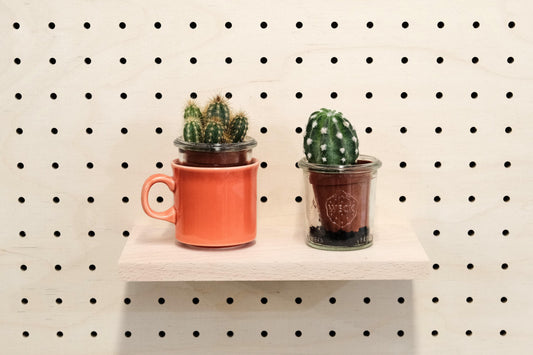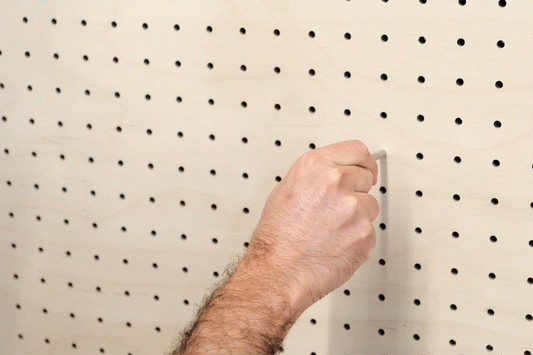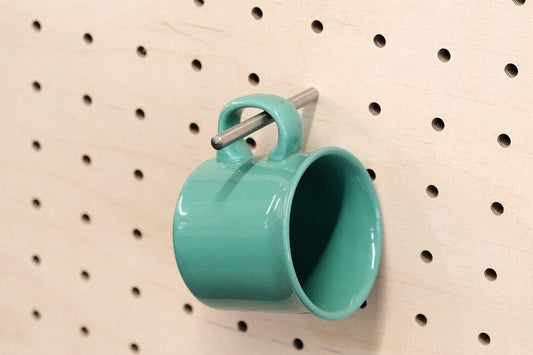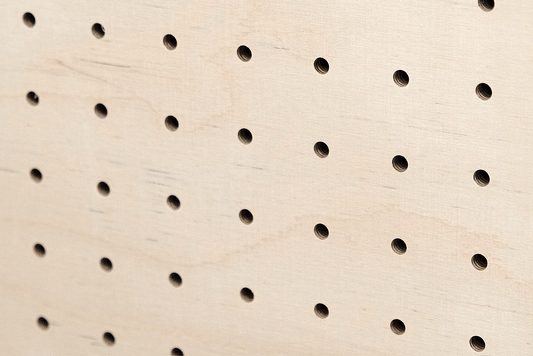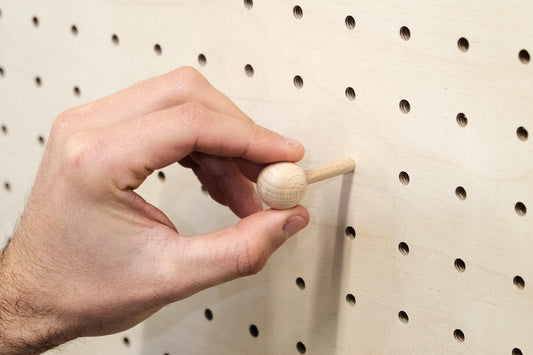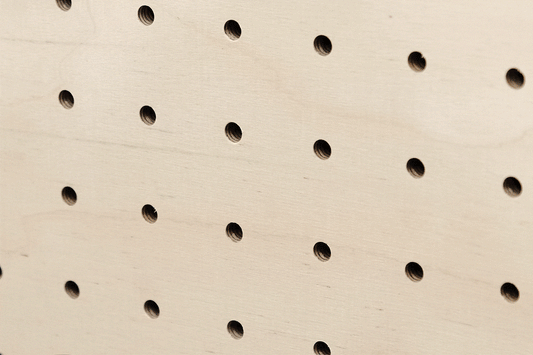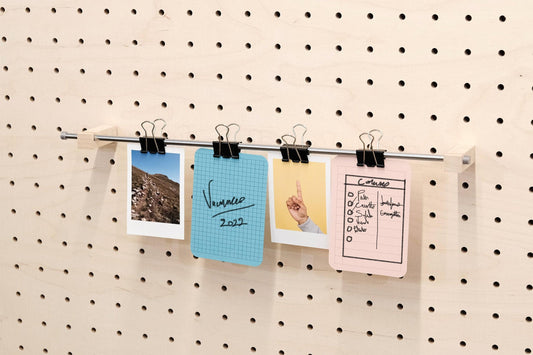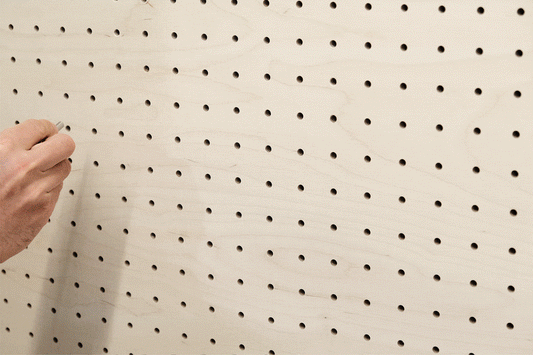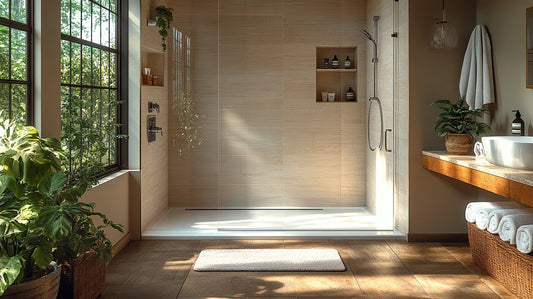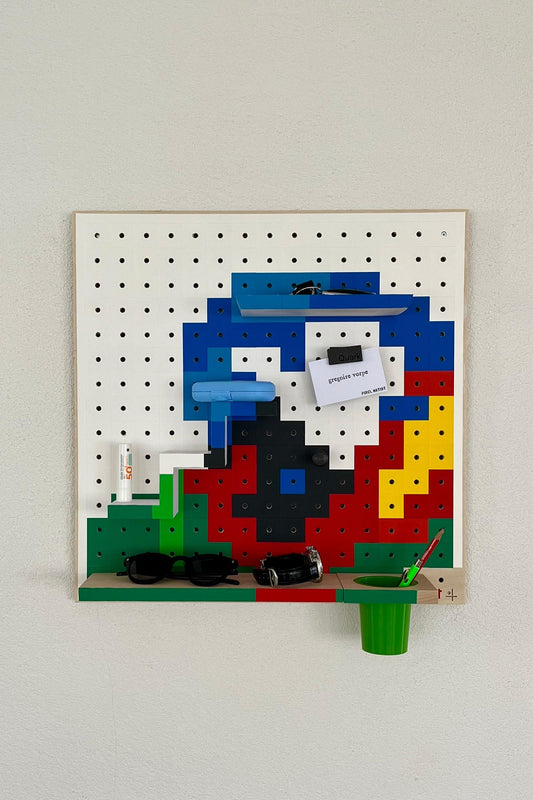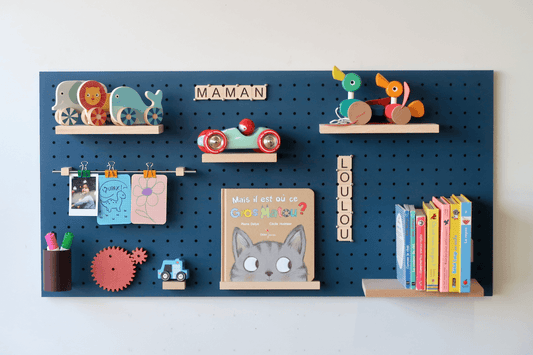The Montessori method, named after Italian educationalist Maria Montessori , is a renowned educational approach that emphasizes the holistic development of the child . Based on the idea that every child is naturally curious and eager to learn, this educational philosophy highlights the importance of creating an environment conducive to the development of their abilities . At the heart of the Montessori method is the concept of autonomy , independence and respect for the rhythm of each child.
By providing toys and materials adapted to their age and interests, we promote their learning in a natural and balanced way.
By adopting this thoughtful approach to tidying up, you will help stimulate your child's curiosity , develop their sense of order , and promote their independence while creating a harmonious environment that will encourage them to reach their full potential . Let's discover together how to put these principles into practice and offer your child an educational and adapted play space according to the Montessori method.
Create a well-defined play space using the Montessori method

A clearly demarcated environment will offer your child a feeling of security and comfort, allowing them to concentrate fully on their activities. Here are some tips for setting up a play space according to Montessori principles
- Demarcate a dedicated space
Choose a place in the house where your child can play independently and safely . This could be a part of their bedroom, a corner of the living room or even a specially designed playroom. Make sure this space is clearly demarcated, preferably avoiding visual and sound distractions from other areas of the house.
- Use activity mats or mats
Activity mats or mats are essential elements for demarcating play areas in the dedicated space. These demarcated surfaces offer the child a personal space where they can place their toys and activities freely. Mats are also very practical for promoting order and organization, as they help to demarcate the space for each activity and encourage the child to put the toys back on the mat after use.
- Choice of location
Choosing the location for your child's play space is crucial. Opt for a quiet place , far from distractions, but also easily accessible for your child. If possible, choose an area well lit by natural light to provide a welcoming and pleasant environment. Also ensure that the space is secure, by keeping dangerous or fragile objects away.
An organized environment adapted to their needs will encourage them to feel confident in discovering the world around them independently. In addition, by establishing this play routine in a delimited space, you help to develop their sense of order and promote their concentration .
Reduce the quantity of toys

By reducing the quantity of toys, you promote the development of responsible consciousness and critical thinking in your child. He will thus be able to grow up in an educational, stimulating play space adapted to his needs.
- Promote attention and concentration
A play environment overflowing with toys can be distracting for the child. Too many choices can scatter him, preventing him from concentrating on a specific activity. By reducing the amount of toys available, you allow your child to develop more focused attention , giving them the chance to fully immerse themselves in each game and activity.
- Sorting and selecting toys
To reduce the number of toys, sort them based on their relevance to your child's age and interests. Keep in mind that toys appropriate for his developmental stage are more likely to pique his interest and encourage his learning. Select educational, stimulating and durable toys, rather than passive or overly specific objects that could limit their creativity.
- Involve the child in the process
Involving your child in sorting and selecting toys is a great way to help them develop their sense of independence and responsibility . Get him actively involved by asking him to choose his favorite toys and explaining why certain toys could be given to other children who might appreciate them more. This approach allows him to feel listened to and respected in his choices, thus strengthening his self-confidence .
Organize toys neatly
To create a harmonious play environment according to the Montessori method, it is essential to organize the toys in an orderly manner. This promotes the child's autonomy and provides a space conducive to concentration and exploration . Here are some ideas and tips:
- Shelves at child height
Use child-height shelves to store toys. This allows the child to easily see and access their toys without needing to ask for help. Open shelves provide clear visibility of available toys, encouraging the child to choose and explore independently .
- Clear storage bins
Use clear storage bins to store toys. This allows the child to see what is inside each bin without having to open them all. For example, label bins with pictures or simple words to help the child associate toys with their appropriate locations.
- Define spaces for each type of toy
Create specific areas for each type of toy. For example, a corner dedicated to construction games, another to puzzles and so on. This helps the child associate toys with specific categories and store them properly after use.
- Importance of tidying up after each use
Explain to your child the importance of putting away toys after each use. Show him how to put toys back in their respective places on shelves or in storage bins. This promotes respect for their environment , in addition to making the next play session easier .
By encouraging tidying up after each use, you also instill organizational values in your child, which will be beneficial throughout their life.
Encourage independence with Montessori toy shelves
Montessori toy shelves are a clever solution to encourage the child's autonomy and development . Specially designed to meet the needs and abilities of the child. These shelves therefore offer a practical approach to storing toys . Here's how they promote child autonomy and how to organize toys in an attractive and accessible way on these shelves:
- Encouragement of independence
Montessori toy shelves are designed to be at the child's height. Allowing him to see and choose toys for himself . This independence promotes autonomous decision-making and the development of self-confidence in children. By having control over his activities, he also learns to respect his own rhythm. He thus develops his sense of responsibility.
- Organization by categories
As I said before, to make the shelves attractive and accessible, organize the toys into clear categories . Use clear storage bins or baskets to group toys from each category.
- Rotating toys
To maintain the child's interest and maintain order on the shelves, practice rotating toys. You can select a few toys to display at a time, while the others remain in reserve. Change the available toys periodically , which will stimulate the child's curiosity and encourage him to discover new activities.
- Spaces conducive to concentration
Well-organized toys on uncluttered shelves provide a calming , concentration-friendly environment. Help your child put toys back in their place after use. Also show him how to store toys in an orderly manner.
Independent access to toys stimulates their creativity , curiosity and desire to learn. By organizing toys, you create a harmonious environment. Which promotes the overall development of your child according to Montessori principles.
In conclusion
The Montessori method offers a thoughtful and balanced approach to storing toys and creating a stimulating play environment for children. In summary, here are the key principles to remember:
Simplicity, Accessibility, Order and Rotation of toys: Simplicity promotes concentration , accessibility encourages autonomy , order develops responsibility , and rotation stimulates the child's interest . These combined principles contribute to a balanced and educational play environment according to the Montessori philosophy.
We strongly encourage parents to put these tips into practice to create a play space that promotes the harmonious development of their children. By adopting the Montessori method for storing toys, parents can support their children's natural curiosity , stimulate their creativity and develop their autonomy from an early age.
We also look forward to hearing about your Montessori storage experiences and tips.
I hope you enjoy the article and can help you with your little ones! Please feel free to share your comments and ideas below 😉










